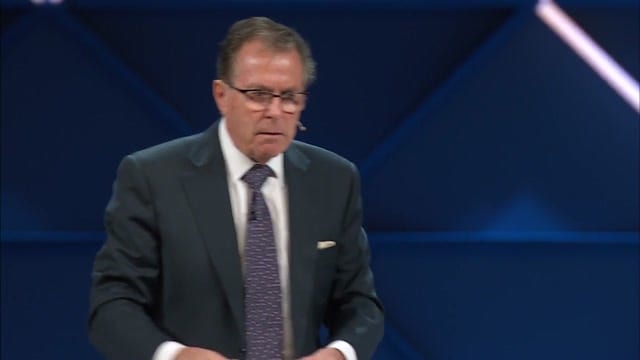
Simon Sinek explains the difference between rules for a finite game and an infinite one.

Simon Sinek explains the difference between rules for a finite game and an infinite one.

Bishop T.D. Jakes shares his perspective on handling the critics and roadblocks we encounter on the path to great leadership.

I started on a quest to make my life and ministry relevant, significant and find a way to contribute to humanity.
The 2014 Summit was a turning point for me and my ministry. The idea that “the church is the hope of the world,” the concept of “leading people from here to there,” and also asking the question, “how will you change the lives of others?” created a new rhythm in my mind and actions.
I started on a quest to make my life and ministry relevant, significant and find a way to contribute to humanity. I started to think of ways to benefit my community, and came up with a concept called “georgeonomics,” which is based on the idea of growing, making and doing what you can instead of buying it.

The “georgeonomics” concept has had a multiplying effect on our community. Gardening is helping to feed my family, bless people in my church and others to support themselves by earning an income through it. In the next two years I’d like to see “georgeonomics” become a brand of impact and an answer to poverty in our communities, and beyond.
Gardening is helping to feed my family, bless people in my church and others to support themselves by earning an income through it.
I just returned from a province where I spoke to 60 church leaders from five districts. A new wave has been created where people want to work with their hands to support themselves and their communities.
At the Summit, I’ve learned that our God is the God of processes, systems and structures and this is what we want to continue to learn from the Summit. Not attending the Summit would have robbed me of the new ideas I’ve gained. My world and ministry would not be moving forward.

I believe in the Summit, and have brought others so they could experience transformation like I have. Our church is currently working on a model for raising up leaders in our community that starts with an innovative fair to inspire youth to help them unleash their life purpose.
I believe in the Summit, and have brought others so they could experience transformation like I have.
We will continue to host the Summit because it has been a huge blessing to our congregation and our community as we pursue our dream to raise global leaders.
To those who’ve made the Summit possible in Zambia, thanks for coming into my space and changing my way of thinking for the better of my community.

Years ago, a friend of mine quit his job as a consultant to take a senior leadership position at our church. After a few months in the role, I asked him how things were going. I was wondering how ministry life compared to his marketplace experience. His response was instantaneous. “I had no idea how much of my role would involve difficult conversations.”
That pretty much summarizes the difference between consulting on leadership and actually leading, doesn’t it? Leadership is ripe with difficult conversations.
GLS faculty member Sheila Heen has helped explain why. Difficult conversations are the product of deeply caring about things that matter greatly.
Leadership is ripe with difficult conversations.
Over time, we’ve increasingly tried to encourage our organization’s leaders with the biblical features of difficult conversations in hopes that they’d lean into them to a greater degree.
I’m often reminded of the way God intended the people of Israel to be cared for when he outlined a support structure to Moses through his father-in-law in Exodus 18. His goal for Moses, expressed in verse 22, was for these newly appointed leaders to “Serve as judges for the people at all times, but have them bring every difficult case to you; the simple cases they can decide themselves.”
To optimize the support of all the people—and to facilitate the most sustainable leadership possible—God’s vision was for the most senior leader to be freed up, specifically for the most difficult conversations. We try to remind our leaders, especially our most senior leaders, that difficult conversations aren’t just part of the job; they’re the very essence of what it means to be a senior leader.
Sometimes people avoid difficult conversations out of care for the person. We remind them, though, that Jesus’ care for people deliberately engaged in difficult conversations. Think about an instance like His conversation with the rich young ruler. This young man approached Jesus because he was curious about what it took to experience a life with God.
In Mark chapter 10 it says, “Jesus looked at him and loved him. ‘One thing you lack,’ He said….” Jesus provided the hard truth to people around Him because of His perfect love for them. To Him, skirting issues or avoiding difficult conversations prevented a full expression of love for people. We remind our leaders that the greatest gift you can give the people you serve is the honest truth.
We’ve found that the more our leaders can associate difficult conversations with expressing love, the easier and more effective those conversations can be.
The ultimate benefit of difficult conversations is the benefit they bring to the individuals we are leading. There’s a positive by-product for everyone when difficult conversations become the norm for the culture of your organization.
Ephesians 4:15 teaches, “Speaking the truth in love, we will grow to become in every respect the mature body of him who is the head, that is, Christ.” Difficult conversations done well—where hard truth is spoken from a heart of love—serve not only to provide information, but also to stimulate transformation.
Difficult conversations are one of the greatest crucibles for growth. We’ve seen tremendous growth in individual character development, team health and unity, work performance, organizational effectiveness and ultimately community impact as we’ve grown in our commitment to having these difficult conversations.
As we’ve experienced the benefit of difficult conversations both personally and organizationally, we’ve made a deeper commitment to encourage our leaders to engage in them.
The more we appreciate the gift of difficult conversations, the more frequently and effectively we’re able to engage in them.
It was a shock for my friend to have difficult conversations in his new job. Now, when we orient new people to our workplace, one of the core values we highlight for them is, “We go there.” It’s a statement that declares our desire to consistently lean into difficult conversations and to set their expectations accordingly.
Difficult conversations are a tremendous gift.
The more we appreciate the gift of difficult conversations, the more frequently and effectively we’re able to engage in them.
The next time you’re tempted to avoid a difficult conversation, consider what you’re missing, lean in and go for it!

Horst Schulze describes the initial process of starting a business or expanding a current business into a new market. He also shares the importance of sufficiency in creating an excellent business.

Horst Schulze describes the initial process of starting a business or expanding a current business into a new market. He also shares the importance of sufficiency in creating an excellent business.

WOW ideas to life, don’t HOW them to death.

Strive Masiyiwa discusses with T.D. Jakes the importance of building a business around a basic human need.

Danielle Strickland speaks to the fear that prevents leaders from bringing unity to men and women working together and shares two concepts that can bridge gender differences.

John Maxwell describes the mindset leaders must develop, to lead where they haven’t been before.
“We welcome and encourage comments on this site. There may be some instances where comments will need to be edited or removed, such as:
If you have any questions on the commenting policy, please let us know at heretoserve@globalleadership.org”
Recent Comments